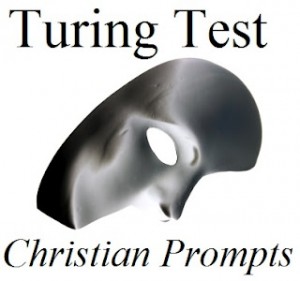This is the seventh entry in the Christian round of the 2012 Ideological Turing Test for Religion. In this round, the honest answers of Christians are mixed in with atheists’ best efforts to talk like Christians. It’s your job to see if you can spot the difference. The voting link appears at the end of the entry, and you can look at all entries in this round here.
When (if ever) have you deferred to your philosophical or theological system over your intuitions?
What’s intuition? It’s just a set of heuristic rules that lets you make snap judgments based on pattern recognition without thinking through all of the details of a particular situation. These rules are shaped by experiences and deep thinking about particular subjects.
Living in the world, I find it is difficult to correctly shape moral intuitions, so I often have to defer to the teachings of the Church. Let me give an example. I have a good friend at work who is a practicing homosexual. I love him dearly, as a friend, but — and he knows this — I cannot support his lifestyle. My moral intuition, however, tells me that what he is doing is okay. I know lots of homosexuals who are happy and seem to have fulfilling relationships. Interacting with those people shapes my intuition. But the truth is often counterintuitive, so I have to defer to the teachings of the Church on homosexuality instead of relying on that intuition.
The point is that intuition is a tool, and like any tool it has situations where it doesn’t work. In general, when the experience of day-to-day life is in conflict with the teaching of the Church, I defer to the teaching of the Church.
Are there people whose opinions on morality you trust more than your own? How do you recognize them? How is trusting them different than trusting someone’s opinion on physics?
Of course! This is why Christ appointed the Church. Our intuitive moral beliefs are warped, so we need the guidance of the Church.
This is no different than trusting the general opinion of a scientific institution, for example, the National Academy of Sciences on evolution or global warming. Although there are differences between the moral authority of the church and the scientific authority of an academic body, insofar as I am ignorant laity and they are authoritative sources of knowledge, the two are analogous.
Let me point out, by the way, that the trustworthiness of the institution does not imply the trustworthiness of every single individual in the institution. That’s a fallacy of composition. Even though the Church is infallible and communicates moral judgment and guidance, that does not imply that every single clergyman is an infallible source of moral guidance. (This has been tragically demonstrated over the last decade.) Likewise, there are climate scientists who do not believe global warming is occurring. But the existence of those scientists does not imply that the consensus scientific opinion is false, just as the sins of some clergy do not imply that the Church is not the supreme moral authority on Earth.
Can you name any works of art (interpreted pretty broadly: books, music, plays, poetry, mathematical proofs, etc) which really capture the way you see life/fill you with a sense of awe and wonder? You can give a short explanation or just list a few pieces.
I don’t frequently look for self-reflection in art — when it comes to art appreciation, I find I am a Wildean aesthete, not a Romantic looking for meaning — so it’s difficult for me to put together a list of works of art that capture how I see life. This was true even when I was going through an extended period of questioning my faith, so I don’t think that my answer on the other half of the Turing test is going to be much different.
In any case, please forgive the paucity of this list. Art/experiences that induce deep emotional stirring:
- Easter Alleluia
- 2nd movement of the Eroica
- Bach’s mass in b minor
- The Easter Vigil Mass, especially the lighting of candles
Other activities that induce a sense of wonder:
- Gazing up at a clear night sky. (I have recently become aware of the day-to-day movement of the Moon and planets, probably because I’ve been walking to work more. I enjoy the intuitive experience of order in the universe.)
- Eucharistic adoration; the peace of a dark chapel, drifting incense, and focusing on Christ’s sacrifice and presence.
Click here to judge this entry, and, once you’ve voted, feel free to speculate and trade theories in the comments or look at other entries in this round.











